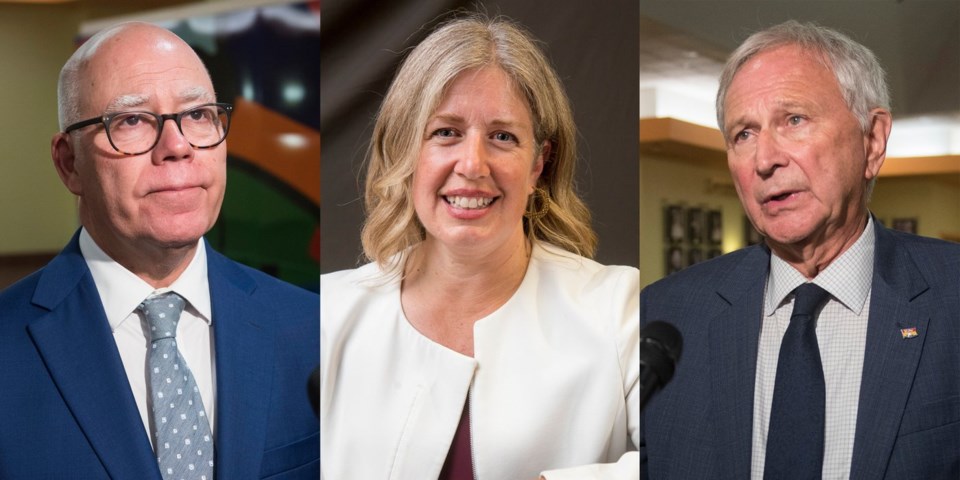FREDERICTON ŌĆö New Brunswick's election campaign has offered voters a sharp division in viewpoints for the future of the province, especially between the two leading candidates for the premier's office.
Progressive Conservative Leader Blaine Higgs, a unilingual former oil executive running for a third term as premier, presented voters with a two-page platform containing 11 promises, a few of which signal the social conservative bent his party has taken. And he has been noticeable in his absence ŌĆö on roughly one-third of the days since he called the election on Sept. 19, Higgs has held no public events.
The Liberals, by contrast, have made 100 promises ŌĆö many of which focus on health care and housing ŌĆö and bilingual leader Susan Holt, a former consultant and provincial civil servant, has taken full advantage of the campaign's 33 days, taking few off.
Higgs summed up Monday's election as one of the most significant in the province's history.
"There's very stark differences between the parties that are running," he told reporters last week. "I truly believe that the outcome will define the future of this province."
The Tories promised to cut the harmonized sales tax by two percentage points, from 15 per cent to 13 per cent, and to "respect parents." The latter promise refers to a 2023 decision by the Tory government to require teachers to get parental consent before they can use the preferred first names and pronouns of transgender children under 16.
The Liberals have promised to open 30 community health clinics across the province by 2028 and eliminate the provincial sales tax on electricity bills for residential customers.
Jamie Gillies, a political scientist at St. Thomas University, called the Liberal campaign "traditional," one that has put Holt at the centre; the Progressive Conservatives, he said, focused much less on the party leader.
He said Holt had a "very clear campaign strategy, which was to focus like a laser on health care."
"I think they probably succeeded in pushing that as the No. 1 issue during the campaign in the minds of voters. Now, whether the election turns on health care, we're going to find out on Monday," Gillies said.
Voters will also discover on Monday whether the Liberals or Tories win a majority; if neither does, the third-placed Green Party could play an outsized role. Leader David Coon has deflected accusations he has a list of demands ready for Holt in exchange for his party's support in the event her party earns a minority of seats but collects more than the Tories.
Polling numbers have favoured the Liberals in the campaign's final stretch. Mainstreet Research, in a poll released Saturday, reported the Liberals had a six-point lead over the Progressive Conservatives among respondents. About 43 per cent of survey participants said they would vote for the Liberals while 35 per cent said they'd go with the Tories and nine per cent backed the Greens.
The poll, conducted by phone between Oct. 17-19, had a sample size of 724 and a 3.6 per cent margin of error.
Poll aggregator 338sa╣·╝╩┤½├Į.com projected the Liberals will win 25 seats ŌĆö just enough for a majority ŌĆö and the Tories will win 22, but the race is close. The Greens are far behind in the projection, with about two seats anticipated.
The Greens have also focused their campaign on health care, promising to spend $380 million a year on the network and to decentralize decision-making to give more freedom to hospitals. Coon, who was described as a possible kingmaker by Gillies, is also promising to implement a guaranteed income to rid the province of "deep poverty."
"There is a chance that the Greens can hold the balance of power," Gillies said, in case the Liberals fall short of a majority.
The results of the election will also show whether Higgs was correct that his changes to the gender identity policy in schools will encourage his base to vote. "So we're going to see if voters reward or punish the premier for kind of doubling and then tripling and quadrupling down on that issue," Gillies said.
Tom Bateman, political science professor at St. Thomas University, said the Progressive Conservative campaign was "quite low-key and shorn of promises" except for the "expensive" two per cent cut in the harmonized sales tax. That promise will cost the province roughly $450 million a year when fully implemented.
"I would say that Mr. Higgs has been relatively low-profile, which kind of makes sense given that he's not the most popular man on the block at the moment," Bateman said.
He described the Liberal promises as "all things bright and beautiful" and "very expensive" ŌĆö and that can't all be fulfilled in one term.
The other factor that could play a role in deciding who gets the province's top job could be likability, he said.
Bateman said voters "want good policy, they want good government, and they want leaders with whom they would like to have a beer, you know, some Saturday afternoon, and sometimes just can't get it all.
"But Mr. Higgs, you know, has a certain kind of approach to leadership and contact with the public, and I would say he appears a little frosty to the intermittently interested person, and that may cost him a couple of votes."
This report by The Canadian Press was first published Oct. 20, 2024.
Hina Alam, The Canadian Press



